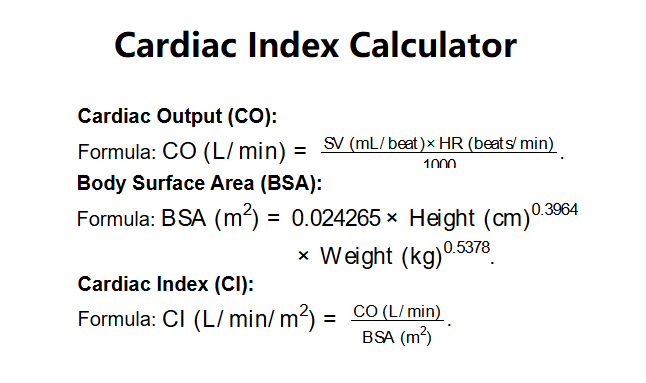1. What is a Cardiac Index Calculator?
Definition: This calculator computes the Cardiac Index (CI), a measure of the heart’s pumping efficiency relative to body size, using Stroke Volume (SV), Heart Rate (HR), height, and weight to calculate Cardiac Output (CO), Body Surface Area (BSA), and CI.
Purpose: CI evaluates whether the heart delivers sufficient blood flow relative to body size, crucial in critical care, cardiology, and anesthesiology for assessing heart function and guiding treatment.
2. How Does the Calculator Work?
The calculator takes stroke volume, heart rate, height, and weight with selectable units and computes:
- Cardiac Output (CO):
- Formula: \( \text{CO (L/min)} = \frac{\text{SV (mL/beat)} \times \text{HR (beats/min)}}{1000} \).
- Calculates the volume of blood pumped by the heart per minute, with selectable output units (L/min, mL/min).
- Body Surface Area (BSA):
- Formula: \( \text{BSA (m}^2\text{)} = 0.024265 \times \text{Height (cm)}^{0.3964} \times \text{Weight (kg)}^{0.5378} \).
- Calculates BSA using the Haycock formula, with selectable output units (m², cm²).
- Cardiac Index (CI):
- Formula: \( \text{CI (L/min/m}^2\text{)} = \frac{\text{CO (L/min)}}{\text{BSA (m}^2\text{)}} \).
- Measures cardiac output relative to body surface area, with selectable units (L/min/m², mL/min/m²).
Unit Conversions:
- Height: cm, m, in, ft (e.g., 1 m = 100 cm = 39.3701 in).
- Weight: kg, lb (e.g., 1 kg = 2.20462 lb).
- CO: L/min, mL/min (e.g., 1 L/min = 1000 mL/min).
- BSA: m², cm² (e.g., 1 m² = 10000 cm²).
- CI: L/min/m², mL/min/m² (e.g., 1 L/min/m² = 1000 mL/min/m²).
Steps:
- Input your stroke volume, heart rate, height, and weight with chosen units.
- Compute CO, BSA, and CI, displaying results with selectable units.
- View the classification of your CI result based on standard ranges.
3. Importance of Cardiac Index Calculations
Calculating CI is useful for:
- Cardiac Assessment: CI evaluates heart performance, aiding in diagnosing conditions like heart failure or shock.
- Critical Care: Guides treatment by assessing blood flow adequacy relative to body size.
- Monitoring: Tracks heart function changes, supporting therapy adjustments in clinical settings.
Cardiac Index Range
| CI Range (L/min/m²) |
Description |
| Below 2.2 |
Below normal (possible cardiogenic shock) |
| 2.2 - 2.5 |
Low normal (potential hypoperfusion) |
| 2.6 - 4.2 |
Normal |
| Above 4.2 |
Above normal (possible hyperdynamic state) |
4. Using the Calculator
Examples:
- Example 1: Stroke Volume = 70 mL/beat, Heart Rate = 70 beats/min, Height = 170 cm, Weight = 70 kg
CO: \( \frac{70 \times 70}{1000} = 4.9000 \, \text{L/min} = 4900.0000 \, \text{mL/min} \).
BSA: \( 0.024265 \times 170^{0.3964} \times 70^{0.5378} \approx 1.7918 \, \text{m}^2 = 17918.0000 \, \text{cm}^2 \).
CI: \( \frac{4.9}{1.7918} \approx 2.7362 \, \text{L/min/m}^2 = 2736.2000 \, \text{mL/min/m}^2 \).
Classification: Normal (2.6–4.2).
- Example 2: Stroke Volume = 80 mL/beat, Heart Rate = 75 beats/min, Height = 5.58 ft (170 cm), Weight = 154 lb (69.853 kg)
CO: \( \frac{80 \times 75}{1000} = 6.0000 \, \text{L/min} = 6000.0000 \, \text{mL/min} \).
BSA: \( 0.024265 \times 170^{0.3964} \times 69.853^{0.5378} \approx 1.7918 \, \text{m}^2 \).
CI: \( \frac{6.0}{1.7918} \approx 3.3482 \, \text{L/min/m}^2 = 3348.2000 \, \text{mL/min/m}^2 \).
Classification: Normal (2.6–4.2).
5. Frequently Asked Questions (FAQ)
Q: What does Cardiac Index indicate?
A: CI measures the heart’s ability to pump blood relative to body size, in L/min/m². Ranges are: Below 2.2 (possible cardiogenic shock), 2.2–2.5 (low normal), 2.6–4.2 (normal), above 4.2 (hyperdynamic state).
Q: How are Stroke Volume and Heart Rate obtained?
A: SV and HR can be measured via echocardiography or other clinical methods. SV is the blood volume per heartbeat, and HR is the number of heartbeats per minute.
Q: Why is BSA used in CI calculations?
A: BSA normalizes CO for body size, enabling standardized comparisons across individuals of varying heights and weights.
 Home
Home
 Back
Back
